advocate the




Using clear, concise, conversational, and, of course, compelling storytelling, this year’s Global Media and Communications students are writing about important causes to influence public opinion









Using clear, concise, conversational, and, of course, compelling storytelling, this year’s Global Media and Communications students are writing about important causes to influence public opinion




Backstage, in a little room beyond the point of what customers can see in the National Council for the Blind of Ireland (NCBI) charity shop in Galway City, Susan Flaherty and her team of volunteers are sorting and steaming clothes and chatting away happily.
It’s 11am on a Thursday in Octo ber, and the room is piled high with bags full of cast-offs and rails of clothes, all waiting to be priced up and sold.
Frontstage, the store is bustling with customers of all ages. The vin tage section – which boasts authen tic Levi jeans, 1980s puffer vests and ’90s jumpsuits – attracts a few col lege-aged students. A group of older women scrutinise a rail of blouses while a man checks out winter jumpers at the back of the shop.
Susan Flaherty is the manager of Galway’s NCBI charity shop.
With over 13 years of retail experi ence and being an avid second-hand shopper, Galway woman Susan is ex cited about the future of secondhand fashion. She wants more peo ple to be aware of the offerings available.
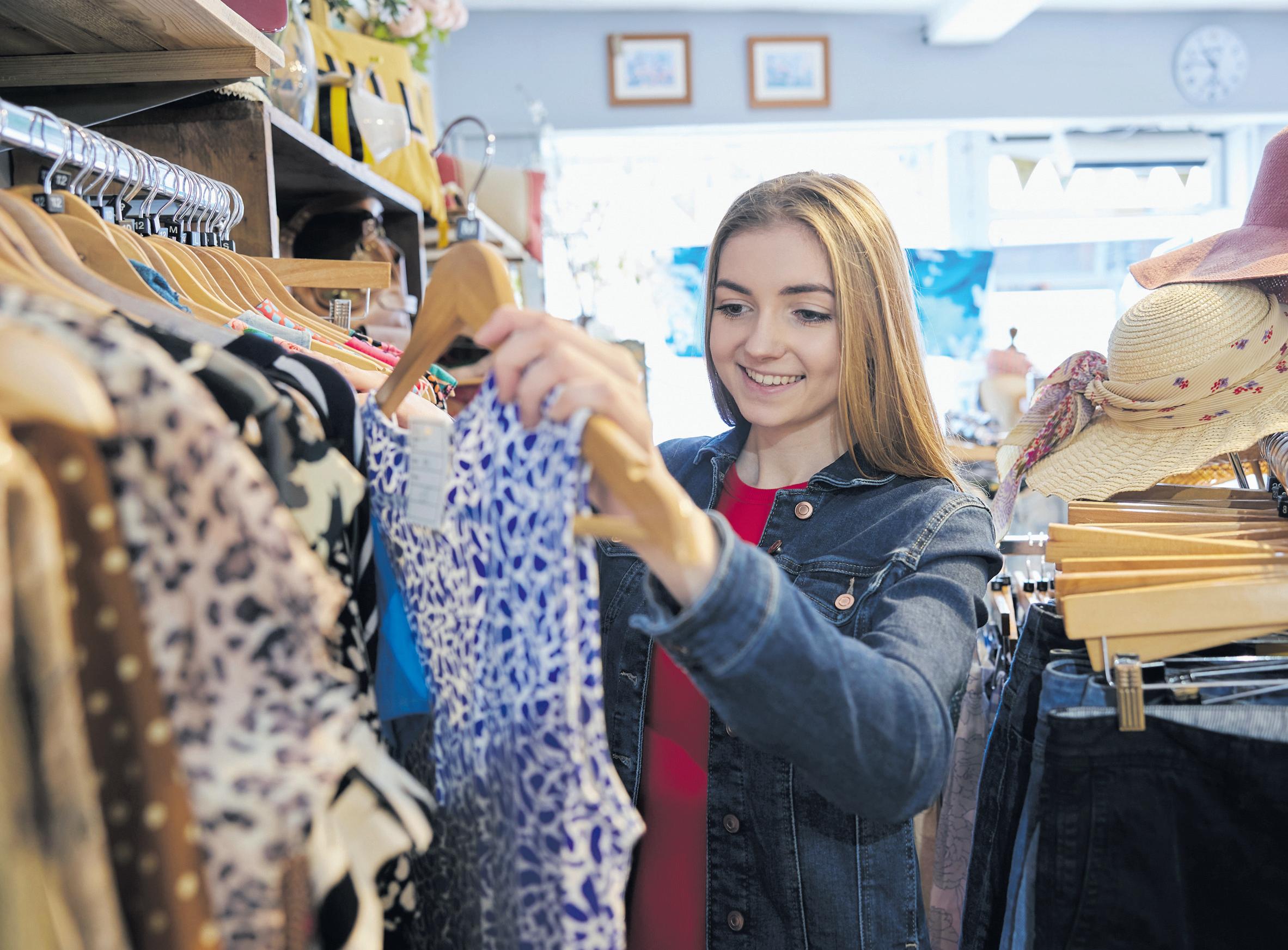
“Second-hand shops have really moved on compared to years ago,” says Susan. “It’s not just anything and everything for sale. The stan dards are higher, and the clothes’ quality is better than in the past.”
In our environmentally-conscious society, charity shops around the country report increased footfall.
According to a recent survey from NCBI, 20 per cent of respondents visit a charity shop at least once per month. While 70 per cent of respon dents shop second-hand for the bar gains available, 36 per cent enjoy the sustainability benefits that come with shopping second-hand.
Unfortunately, many of us have misconceptions about second-hand clothes and need guidance on how to shop sustainably. But the assump tion that the selection of secondhand clothes available is limited, of poor quality or outdated couldn’t be further from the truth.
“Don’t underestimate [secondhand shopping] it’s come a long way,” says Susan. “The quality and the price are there. And when you consider you’re helping a charity along with the sustainability factor, it’s a win-win,” she stresses.
The second-hand retail market is booming and provides a sustainable and affordable alternative to new fast fashion.
However, fast fashion companies re main popular, despite increased
public awareness of the problems with fast fashion.
Advertising campaigns from big brands lure us to their wares, and the enjoyment we get from buying cheap fast fashion, even to the detri ment of our wallets and our planet, keeps us trapped.
Fast fashion’s negative impacts are well-known.
According to the UN, fast fashion is responsible for 8 per cent of global carbon emissions - that’s more than international flights and maritime combined.
Numerous high-profile tragedies have highlighted worker exploitation in the industry.
Meanwhile, with the effects of the climate crisis now arriving on our doorstep, we must escape the trap of fast fashion.
And if you think shopping sustain ably means breaking the bank on be
spoke pieces, this couldn’t be further from the truth.
“We have options on the lower and higher end,” says Susan. “And for students, we offer a 10 per cent discount with a valid ID. So, it’s defi nitely accessible to everyone.”
Quality checking all donations be fore they get to the rails is key to NCBI’s success.
“We get a mix of donations and vintage dead stock that we buy our selves,” says Susan. “I’m strict on what goes out – if I wouldn’t wear the item myself, it doesn’t go on the shop floor.”
It’s this approach that has helped NCBI achieve success with a wide consumer base. By ensuring only first-rate clothes hit the shop floor, charity shops like NCBI’s Galway branch can provide a wide range of high-quality clothes for their shop pers.
Susan says that people are turning to second-hand to build a unique wardrobe – and the second-hand se lection rivals high-street offerings.
Given the current cost-of-living cri sis, investing in quality pieces that will last you for years and building a second-hand capsule wardrobe is be
coming more appealing.
“We offer a broad range of cloth ing,” says Susan. “We have speciality items like men’s suits and debs dresses, as well as the basics like blouses, skirts, tracksuit bottoms and trousers.”
“And you can use these items in different ways, like making a capsule wardrobe or getting ready for a spe cial occasion,” she says.
There is definitely a change in mind set towards consuming more con sciously, driven by awareness and concern about sustainability and overproduction of clothing.
One concern is that mainstream fast fashion brands ‘greenwash’ –that’s using misleading and false ecofriendly marketing tactics to improve their image, rather than engaging more seriously with sustainability.
If you’re interested in hunting for stand-out pieces that you won’t find anywhere else, while also helping the environment by ignoring fast fashion, check out one of the 470 Irish charity shops nationwide. For newbies, Susan recommends seek ing out vintage pieces.
“One of my biggest tips would be to look out for oversized labels and
to see where the item was made,” she says.
“Take America, for example; you don’t see ‘made in America’ labels on new clothes anymore, so you can be sure you’re getting a true, vintage piece when that’s marked on the tag”.
Clothes from eras gone by repre sent a different attitude toward fash ion. Garments were made with a life time of wear in mind, and this is still visible today.
“Some of the best finds are clothes from countries that no longer exist,” says Susan. “For example, if you see ‘made in Yugoslavia’ on the label, you know you’re getting a real vin tage one-off piece.”
The misconception that secondhand shopping is limiting couldn’t be further from the truth. With options ranging from authentic Y2K pieces to this season’s hottest trends, charity shops are an easy and affordable way to dress in a way that works for you.
Ciara Varley is a student at the University of Galway studying Climate Action, Sustainabil ity and STEM Communication, with the hope of working for non-profit science communica tion organizations in the future. Her previous background is in biotechnology. She spends her time reading about bio-integrated design, exploring second-hand shops, and petting her three cats.
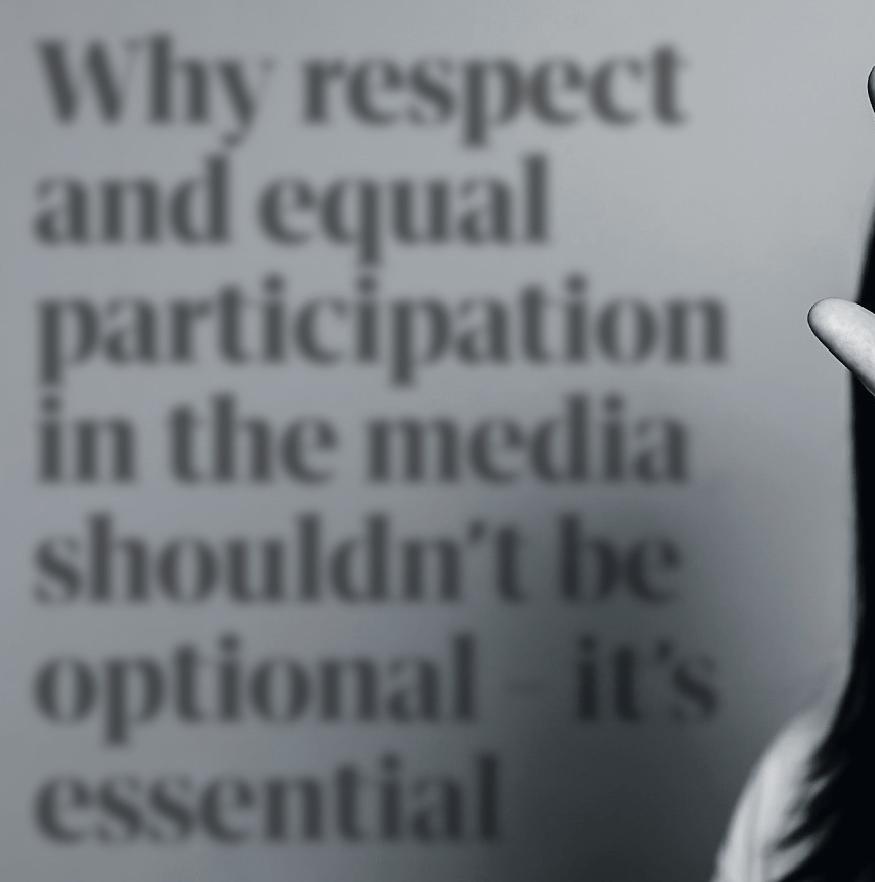
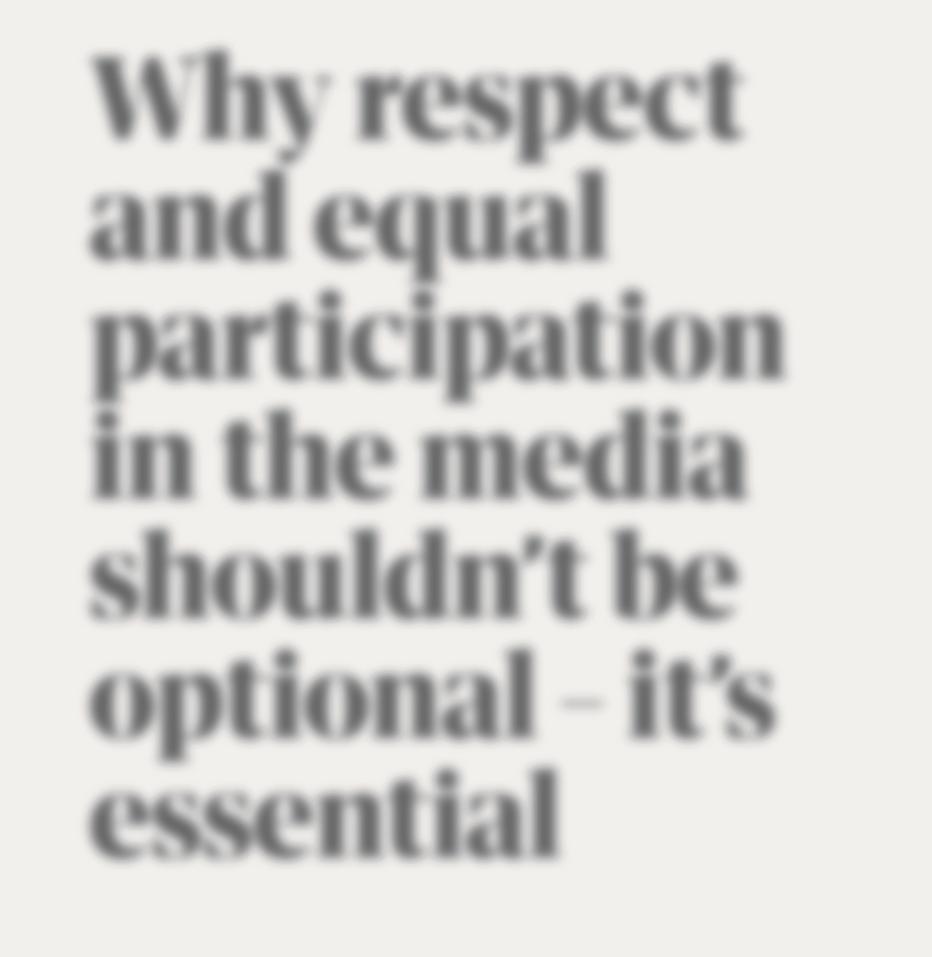
When Sky Sports GAA presenter Gráinne McEl wain took to the stage in Croke Park as mistress of ceremonies for the annual GAA awards in October 2022, she stood in a spot occupied by few women before her.
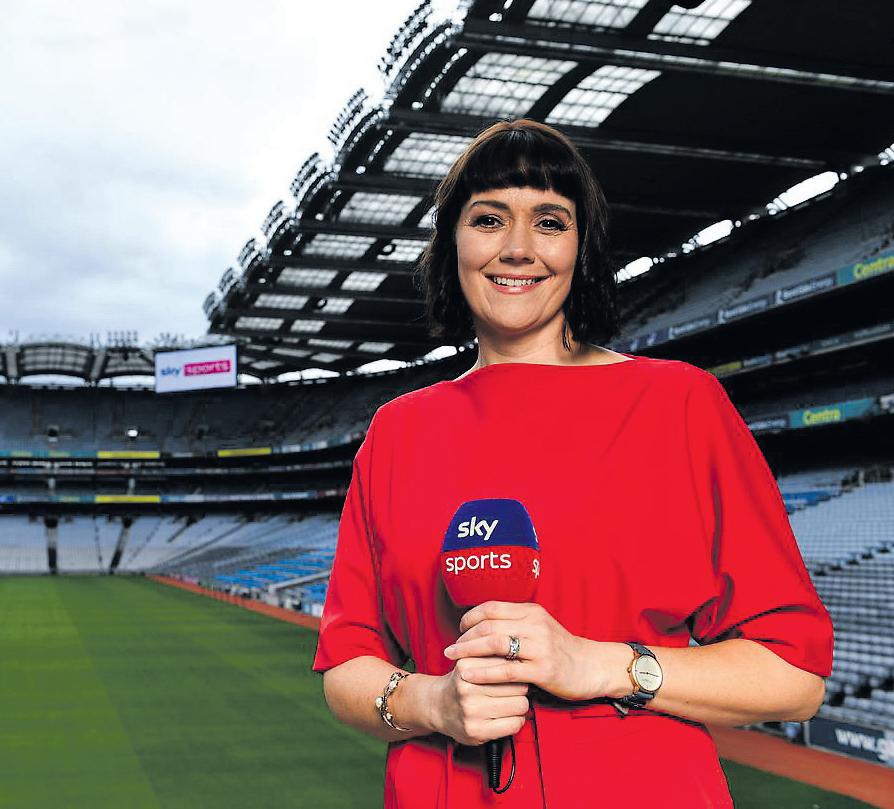
With over a decade’s experience working as a sports and entertain ment broadcaster with Sky Sports, TG4, RTÉ, BBC and Eir Sport, Gráinne’s stellar hosting skills was proof that she was there on merit –and that the idea of tokenism for a woman being involved is gone.
However, when it comes to women in prominent cultural roles, there is an apparent imbalance be tween the numbers of men and women.
That’s why Gráinne’s presence on the podium front and centre was a reminder of why the visibility of women is essential and why tackling the underrepresentation of women in media is so important.
“It’s important to know who you are as a person,” says Gráinne. “You need to have a very strong sense of self when you’re working as a pre senter in the media and not to be persuaded by what people think of you.
“Know who you are and what you stand for.”
Gráinne took an interest in media work while teaching Irish and His tory as a secondary school teacher in Dublin. While reading an Irish news paper, she noticed an advertisement for a role in sports media and de cided to go for it.
A native of Monaghan, Gráinne is a fluent Irish speaker. As well as being the current anchor for Sky Sports GAA coverage, she has worked as a reporter on RTÉ’s flagship GAA high lights show, The Sunday Game, and as a sideline reporter for RTÉ’s live GAA and Athletics coverage.
Outside of sports, Gráinne is steeped in traditional Irish music, having participated in Fleadh Cheoil na hÉireann and Scór competitions from an early age reaching and win ning All-Ireland medals.
Gráinne lives in the Conamara Gaeltacht with her husband and three children.
Women in the media are held to very high standards routed in tradi tional views of gender roles. They
are expected to present themselves in a certain way and are criticised by tabloids and online media for going against the norm.
It is difficult to read insensitive comments about yourself, which is why Gráinne believes having thick skin is vital.
As a media-savvy professional, Gráinne knows that if we want to break negative stereotypes of women off-screen, we’ll also need to tackle them on-screen. Female pre senters, like Gráinne, can inspire ambition for more women entering the media, but only if the many bar
riers confronting them are removed.
Tabloid media outlets have long depicted misogynistic undertones. Insensitive headlines about mental health and body issues can harm how we view ourselves and increase negative stigmatisation.
We’ve seen women like Britney Spears, Sinead O’Connor, and Meghan Markle exploited for their personal struggles. Their issues were used for financial gain and were sometimes laughed at by certain publications.
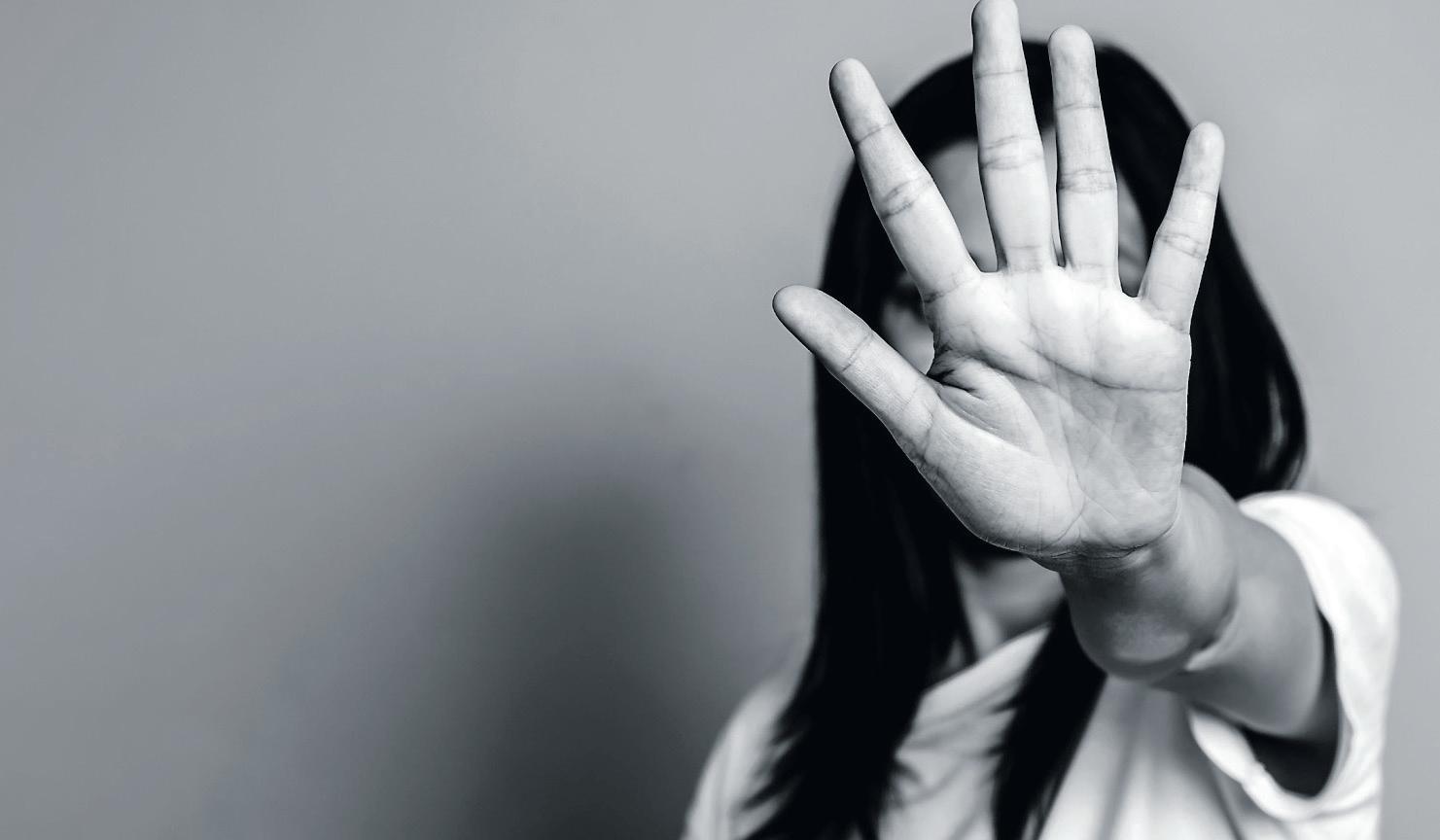
Gráinne admits that as a presenter in sports media, she hasn’t been af fected by tabloid headlines, but she has been a victim of social media backlash.
Online comments on platforms such as Twitter can be hurtful, but Gráinne reiterated how she values the opinions of her loved ones the most.
“Criticism can hurt, especially on social media,” says Gráinne. “Re member who’s important to you be cause the people who are important to you are the ones whose advice and opinions you value the most.”
While the significance of tabloid media has declined since the 2000s, online platforms such as Twitter have been used to spread misinfor mation and hurtful comments.
“When people write or say hurtful things, I often wonder what their agenda is?” says Gráinne. “They’re often negative and don’t view you as a person.
“Being a person in the media, you are open to criticism from other peo ple, but some take it too far. It’s as if a celebrity is something to sell a headline rather than a real human.”
Gráinne has sympathy for women in music and reality television, as they are heavily criticised. “While I am in a different industry to them,
some of the hate they receive is very unfair,” she says.
For example, Taylor Swift was a victim of sexist media and headlines with misogynistic undertones. When Taylor was ‘cancelled’ by the inter net in 2016, she went completely off the grid, taking time to work on her self and her music.
Despite the negative backlash she faced online, Taylor prioritised her health and personal life and has since returned stronger than ever with her recent releases.
Gráinne emphasises the impor tance of staying humble and grounded to combat the negative opinions of others.
Meanwhile, Gráinne is happy to continue being the face of Sky Sport’s GAA coverage, and there’s no doubt that the Monaghan native’s ca reer and passion have made her a role model to young people with big aspirations.
“Confidence is vital,” says Grainne. “Knowing who you are as a person and staying true to your val ues.”
1, Matcha lattes, reading and 5 Seconds of Summer.
Every day, when Mary Finan wakes up, her mobility depends on a battery-operated elec tric wheelchair. Spon taneity is rarely an option for Mary. She must think about so many small things before going anywhere.
Mary is studying Irish language media at the University of Galway. For her, the most frustrating obsta cles are the everyday ones. Living with a disability can make it difficult to achieve things that non-disabled people take for granted.
One of the defining issues that Mary shares with people with a dis ability living in Galway City is access. There are shops she can’t get into be cause of large steps or raised door frames. Sometimes the issue is kerb ing that is nowhere near low enough, frequently obstructed by cars.
Mary would love to have more control of her life.
But what bothers her most is that many places her friends like to go aren’t open to her.
“Without a good accessible city, peo ple with disabilities cannot live full and active lives,” says Mary, who is originally from England.
Mary sometimes considers that the failure to address these problems speaks to a deeply embedded cul tural attitude wheelchair users don’t want a social life. In Mary’s experi ence of living in Galway City, the most basic accessibility needs of dis abled people are often neglected.
In 2004, Mary was diagnosed with myalgia encephalomyelitis, a neuro logical disorder affecting the central nervous system – more commonly known as chronic fatigue syndrome (ME/CFS).
During the Covid-19 outbreak, she contracted the virus, which further deteriorated her health and left her mobility confined to having to use a wheelchair to get anywhere.
“In trying to accomplish what I want or need to do, my condition may deteriorate further,” says Mary.
Mary remembers when she was healthy and did not need a wheelchair to get about life. To her, “life was good, and I was in control. I do not feel that way anymore”, she says.
Researchers still do not know what causes it or how to treat it yet; Mary is hopeful for a break in tech nological advancement by students at the University of Galway.
“With the University of Galway fa mously known as a place for innova tive research, I hope there will be re search to find a solution,” says Mary.
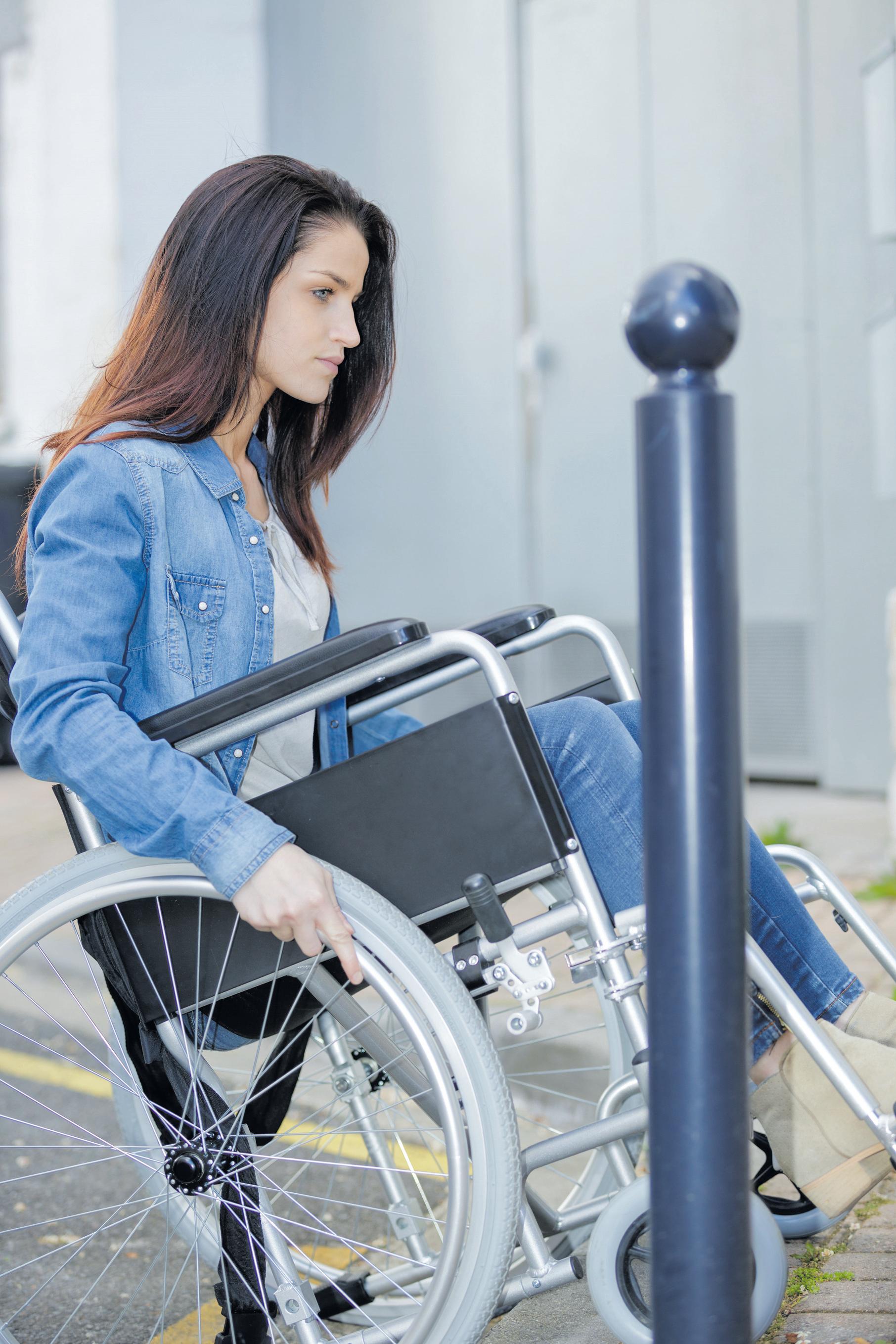
Mary is using her voice to advocate for proper accessibility for people with disabilities in the university and the county.
Mary’s commitment to seeing a change led her to join the support group ME Ireland. The organisation caters to the needs of people with disabilities and gives support on how to cope and advocate for improve ments regarding the day-to-day ex periences of disabled people.
At a local level, Galway County 2022-2028 development plans de scribe people living with disabilities to “include those who have chronic physical, mental, intellectual, or sen sory impairments that, when com bined with other obstacles, may pre vent them from fully and equally participating in society”.
Galway City Council has stated that it will “promote Lifetime Hous ing and Universal Design in all new constructions”.
This kind of housing will enable the future adaptation of units as de
mands change throughout the occu pant’s or owner’s life. It is a proac tive move to address the housing needs of disabled, older, and diverse families and raise the long-term value and sustainability of buildings.
The Council’s policy goal is to ad vance universal design to ensure that all public facilities, including build ings, parks, and recreational places, are inclusive and accessible to those with disabilities. Another notable stride towards greater accessibility for individuals with disabilities is by Gold Star, which in partnership with
Galway City started a programme known as ‘Access Together Galway’. The programme is supported by the United Nations (UN) Convention on the Rights of Persons with Disabili ties (UNCRPD), which Ireland adopted in 2018.
At a global level, the UN's Sustain able Development Goals (SDGs) are a universal call to action to reduce in equality by promoting the social, economic and political inclusion of all, including persons with disabili ties.
Meanwhile, Mary is working with the University of Galway to improve accessibility throughout the campus.
Mary is determined to draw the at tention of the university and local government to the problems faced by those living with disabilities. Re cently, and with help from a fellow student, Mary made a video about how difficult it is for her to get through doors and steep curbs on the university’s campus.
The University of Galway recently adopted the Jam card to raise aware ness of and make people with dis abilities more visible on campus.
“Accessing places is quite terri ble,” says Mary. “Most of the doors at the college are heavy. Those doors weigh about 45-75 kilograms; when I pull the door to make space for my chair, it pushes back against me.
“No matter how hard I try, often I can’t open those heavy doors, so sometimes I have to forego classes or social events and stay indoors.”
The solution she proposes will be to put a push button at the doors; however, according to correspon dence from the college, “the archi tectural design and cost for a button is quite expensive”.
Mary says that although much is being done to provide a good stan dard of living in terms of “income and social welfare” for people with disabilities in Galway, accessibility remains “another case”.
Bitwul Dashe is a Global media and communications student at the University of Galway. She loves reading, writing, taking pictures and travelling the world. She believes you can do anything you set your heart to. She loves warm baths and hugs.

 BY MOLLY McSHANE
BY MOLLY McSHANE
If you’re like me, as soon as your alarm goes off in the morning, you groggily grope for your mobile phone to turn the electronic ringtone off, but you can’t help your self starting the infinite scroll that keeps going like a bottomless pit.
Why do we care so much about the mindless drivel? Why do we compare ourselves to what we see on someone else’s Instagram page? Sometimes it feels like an insatiable checking for likes, comments and forms of approval. We’re constantly hungry for further validation –screen time is as addictive as junk food.
There’s no doubt that social media can be overwhelming and a bit of a battlefield to navigate. Still, I’ve dis covered from talking via Zoom to Dr Eoin Whelan, a senior lecturer in Business Information Systems at the University of Galway, that there are both negatives and positives when it comes to social media.
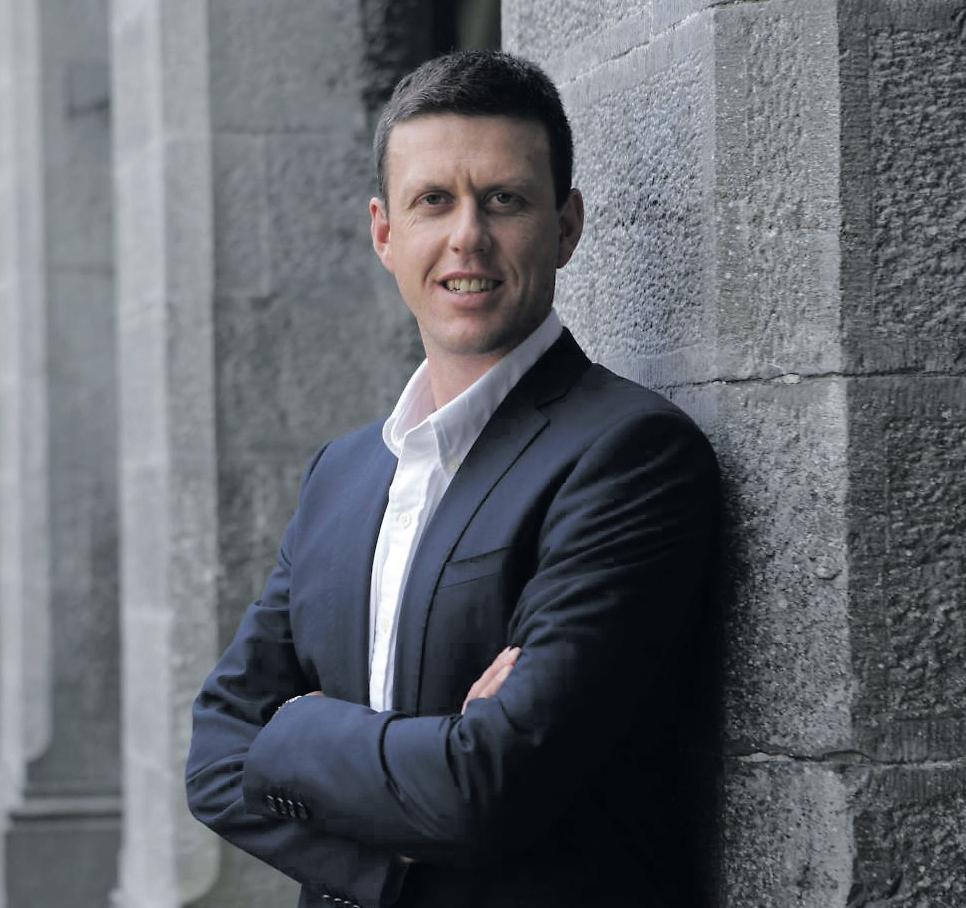
“We’ve done some research on students, particularly students at the University of Galway, and their use of social media,” says Eoin. “We found that it can have a negative im pact on your well-being and student performance as well.”
The adverse effects on students come from the stresses that social media can bring. For example, Eoin says if you’re on TikTok or Instagram and you feel like you are giving too much support to your friends, doing so can be a stressor.

This stress affects students’ work habits because it weakens their selfcontrol. Eoin explains that this weak ened self-control can lead to not
properly studying, and handing in assignments late, for example. “To be good at anything, you need selfcontrol,” says Eoin.
The content on social media can have different effects on different people when it comes to negativity on the internet, according to Eoin.
“It depends on a person’s disposi tion,” says Eoin. “If you’re con stantly looking up to these people [Influencers] and comparing your self to them, that will have a negative impact. Whereas for others, it wouldn’t negatively impact them be cause they realise it’s a fake world.”
It’s important to disconnect and re alise that not everything you see on line is real. Eoin says it’s easy to get
caught up in what you see online, but sometimes you must realise that everyone is trying to portray them selves in the best light.
“You have to look past all the fil tered images and idealistic lives to know that people do not post their entire life online, just the parts that make them look good,” he says.
There are no filters in everyday life, including video conferences, the latest study Eoin is conducting.
Life has completely adjusted after the COVID-19 pandemic. According to Squaretalk, in 2022, 16 per cent of companies worldwide are fully re mote, while 40 per cent of compa nies worldwide have implemented a hybrid style of working.
Eoin elaborates on his research by describing the interaction he and I were having via Zoom.
“I’m looking at the screen here; I
of an impact for females. Women tend to be more concerned about their appearance.”
This is a challenge in a workplace environment, according to Eoin, es pecially if you are worried about how people perceive you. For many, it isn’t easy to stay focused on the task at hand.
However, Eoin has seen some positives from social media in the workplace.
Eoin explains that for young people and professionals, social media is a great place to find inspiration. He discovered that when professionals are active on social media, it can help them be more innovative.
“Social media can provide more information they normally wouldn’t have access to, which allows people to be more creative,” says Eoin.
“This sense of creativity can help you in your career and potentially help students discover their pas sions.”
Think of social media as food for many people; young people seem ingly can’t live without TikTok or In stagram. And in the same way, we can’t live without food. Eoin says, “use it sustainably”.
Eoin compares overexposing our selves to the internet to eating Mc Donalds for every meal; it’s not sus tainable.
“Let’s think about the food we eat,” he says.
“The portions you get throughout the day are important,” he contin ues. “If you gorge on a big meal first
thing in the morning, you’re not going to feel great.
“Same way, if you overindulge on social media first thing in the morn ing, that’s not going to be good.”
And many others share Eoin’s opinions and conclusions. Steven Pinker, a Harvard scientist, describes music as “auditory cheesecake”.
He concludes that, yes, music is enjoyable and increases our levels of serotonin.
However, we do not need music or cheesecake to survive. Nor do we need McDonalds or social media –even though both are enjoyable.
“There is a difference between using technology to educate our selves, connect with friends, and find people who share the same hob bies as you,” says Eoin.
“Compared to following influ encer culture, celebrity culture and spending your downtime scrolling,” he adds.
It’s easy to get caught up in all the negativity surrounding social media. Maybe if we follow Eoin’s advice and consume media in a sustainable way, we can be lucky enough for lightning to strike and be inspired by the next big thing.
Molly McShane is a Master's student studying global media and communications at the University of Galway. She received her Bachelor's in media and culture with a minor in journalism at West Chester University of Pennsylvaia. When Molly's not studying she enjoys drinking coffee and attending concerts.
As mindful users, we can use social platforms to inspire